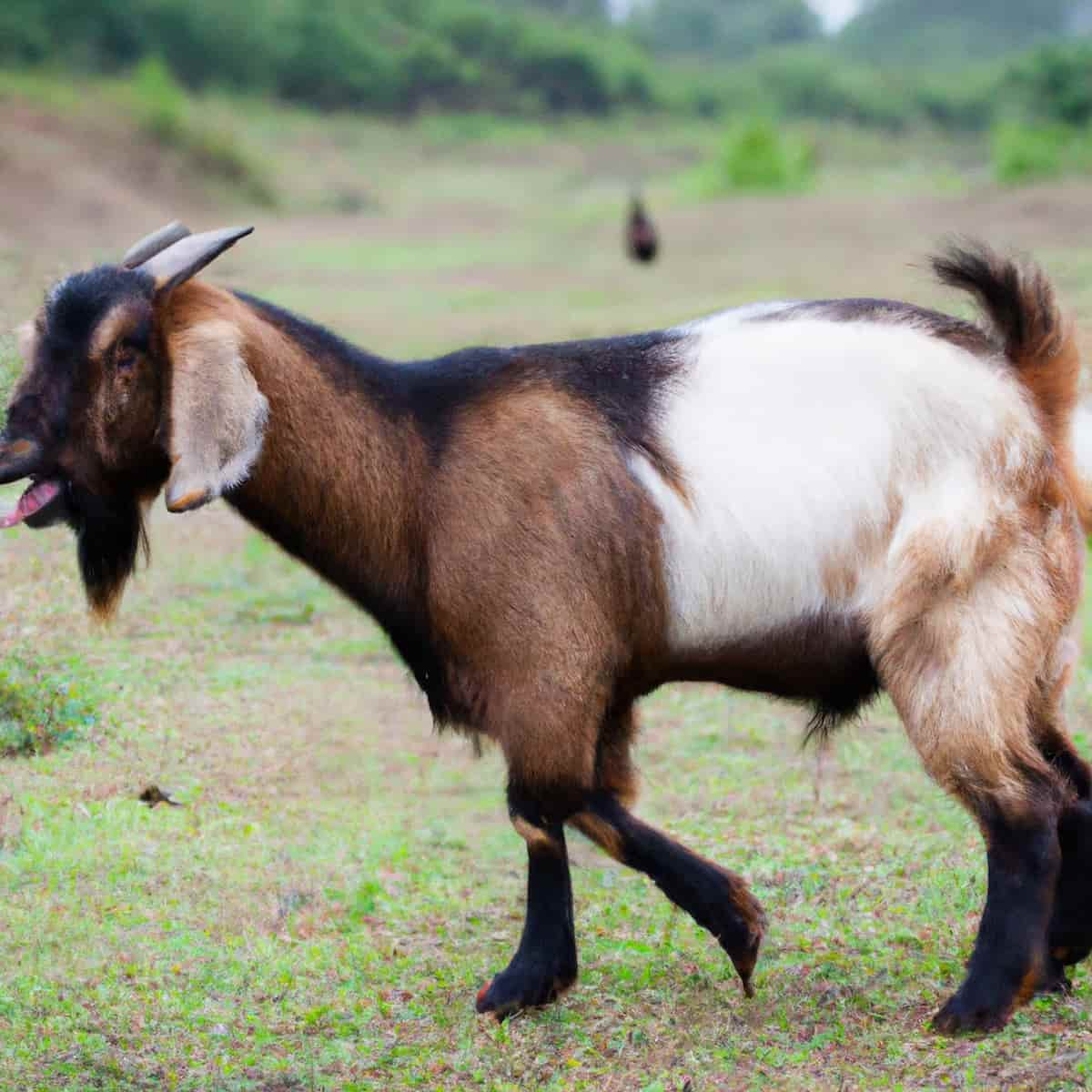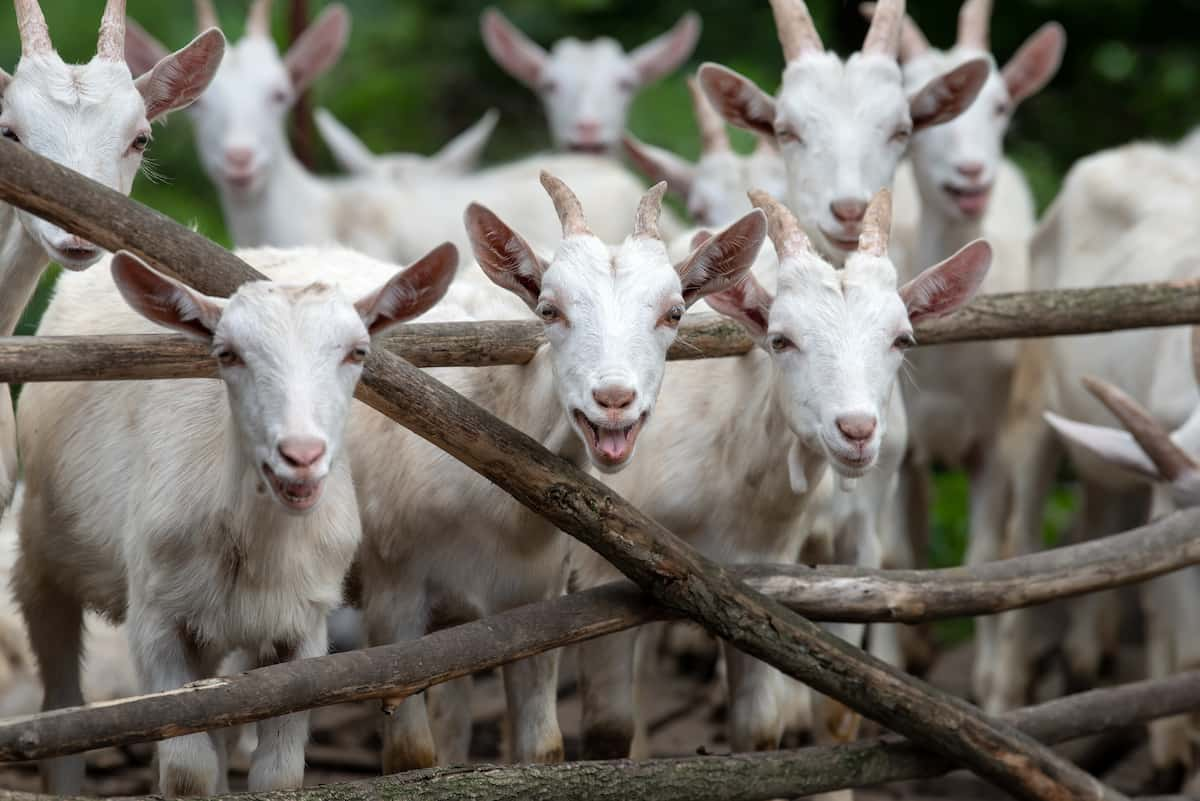Goats are susceptible to several diseases, and as a goat owner, it’s essential to be aware of these diseases, their symptoms, causes, and preventive measures. Below we learn goat diseases symptoms and treatments, deadly goat diseases, common diseases in goats, and their preventions.

Top 10 Goat Diseases
Caprine Arthritis Encephalitis (CAE)
- Symptoms: Weight loss, swollen joints, lameness, difficulty walking, and paralysis. CAE can also cause encephalitis, leading to seizures and death.
- Causes: CAE is caused by a retrovirus, which is transmitted through infected milk, colostrum, and other bodily fluids.
- Prevention: Isolate infected goats, pasteurize milk, and cull infected animals.
- Control: Test your goats for CAE and separate infected goats from healthy ones.
Caseous Lymphadenitis (CLA)
- Symptoms: Abscesses under the skin, often in the lymph nodes, that burst and release pus.
- Causes: CLA is caused by bacteria, which can spread through direct contact or contaminated equipment, such as needles or clippers.
- Prevention: Quarantine infected goats, clean and disinfected equipment, and cull infected animals.
- Control: Test your goats for CLA and separate infected goats from healthy ones.
Goat Pox
- Symptoms: Fever, cough, and the appearance of pox lesions on the skin, mouth, and respiratory tract.
- Causes: Goat pox is caused by a virus spread through direct contact or contaminated equipment.
- Prevention: Quarantine infected goats, keep your herd healthy, and vaccinate your goats.
- Control: Vaccinate your goats, isolate infected animals, and treat secondary bacterial infections.
Foot Rot
- Symptoms: Lameness, swollen and painful feet, and a foul odor.
- Causes: Footrot is caused by bacteria that thrive in damp environments, such as muddy pastures.
- Prevention: Keep pastures dry, provide clean and dry bedding, and trim overgrown hooves.
- Control: Treat infected animals with antibiotics, isolate them, and keep their environment clean and dry.
Gastrointestinal Parasites
- Symptoms: Weight loss, poor appetite, diarrhea, and anemia.
- Causes: Gastrointestinal parasites, such as roundworms and coccidia, can be ingested through contaminated feed and water.
- Prevention: Keep pastures clean, rotate pastures regularly, provide clean water, and use fecal egg counts to monitor parasite loads.
- Control: Treat infected animals with anthelmintics, isolate them, and keep their environment clean.
Johne’s Disease
- Symptoms: Chronic diarrhea, weight loss, and decreased milk production.
- Causes: Johne’s Disease is caused by a bacterium that is shed in the feces of infected animals and can be ingested by other goats.
- Prevention: Test incoming goats, keep pastures clean, and avoid feeding infected animals’ milk to young goats.
- Control: Cull infected goats, isolate infected animals and practice good biosecurity measures.
Enterotoxemia (Overeating Disease)
- Symptoms: Sudden death, lethargy, diarrhea, and abdominal bloating.
- Causes: Enterotoxemia is caused by a toxin produced by a bacterium in the gut, usually due to overeating or changes in diet.
- Prevention: Feed a balanced diet, limit grain and high-carbohydrate foods, and vaccinate your goats.
- Control: Treat infected animals with antibiotics, isolate infected animals, and vaccinate your herd.
In case you missed it: Top 10 Quail Diseases: Symptoms, Causes, Preventions, and Control

Contagious Ecthyma (ORF)
- Symptoms: Lesions around the mouth, nostrils, and udder, that can become scabby and painful.
- Causes: Contagious ecthyma is caused by a virus spread through direct contact or contaminated equipment.
- Prevention: Quarantine infected goats, keep your herd healthy, and vaccinate your goats.
- Control: Vaccinate your goats, isolate infected animals, and treat secondary bacterial infections.
Scrapie
- Symptoms: Behavior changes, tremors, and loss of coordination.
- Causes: Scrapie is caused by abnormal proteins called prions, which can be passed from mother to offspring or through contaminated equipment.
- Prevention: Test incoming goats, avoid breeding from infected animals, and practice good biosecurity measures.
- Control: Cull infected goats, isolate infected animals and practice good biosecurity measures.
Pneumonia
- Symptoms: Coughing, fever, difficulty breathing, and nasal discharge.
- Causes: Pneumonia can be caused by bacteria, viruses, or environmental factors, such as poor ventilation or draft.
- Prevention: Provide good ventilation, avoid overcrowding, and vaccinate your goats.
- Control: Treat infected animals with antibiotics, isolate infected animals, and practice good biosecurity measures.
Frequently Asked Questions about Goat Diseases
What are the Most Common Diseases in Goats?
Goats are susceptible to various diseases, and goat owners must be aware of the most common diseases affecting their animals. Some of the most prevalent diseases in goats include:
- Pneumonia, which is often caused by bacteria and can lead to respiratory distress and fever
- Enterotoxemia, which is a bacterial infection that can cause severe diarrhea and can be fatal
- Coccidiosis, which is caused by a parasite and can cause diarrhea, weight loss, and decreased appetite
- Mastitis which is an inflammation of the mammary gland that can cause pain, swelling, and a decrease in milk production.
Other common diseases in goats include foot rot. This bacterial infection affects the hooves, and caseous lymphadenitis is a chronic bacterial infection that can cause abscesses and swelling in the lymph nodes. Goat owners need to be vigilant in the care and management of their animals, including regular health checks and prompt veterinary care when necessary, to prevent and control these common goat diseases.
How do You Prevent Disease in Goats?
Preventing disease in goats requires a multifaceted approach that includes proper nutrition, hygiene, and management practices. Providing clean and dry living quarters, with adequate space and ventilation, can help prevent the spread of infectious diseases. Maintaining a regular deworming schedule and ensuring goats receive appropriate vaccinations can help prevent common diseases. Proper nutrition is also essential, as malnutrition can weaken the immune system and make goats more susceptible to disease.
In case you missed it: Top 10 Shrimp/Prawn Diseases: Symptoms, Causes, Prevention, and Control

Goats should have access to clean water, good quality forage, and, if necessary, a balanced grain ration. Finally, it is important to monitor goats closely for signs of illness and promptly isolate any sick animals to prevent the spread of disease to the rest of the herd. By following these preventative measures and working closely with a veterinarian, goat owners can help ensure the health and well-being of their herd.
Conclusion
The causes of these diseases vary, but many results from bacterial or parasitic infections. Some diseases can also be caused by poor nutrition or environmental conditions. To prevent these diseases from affecting your goats, it is important to maintain good hygiene practices, provide proper nutrition and housing, and promptly isolate any goats showing signs of disease.
- Feed Your Flock for Less: Top 10 Tips to Save on Chicken Feed
- Ultimate Guide to Ossabaw Island Hog: Breeding, Raising, Diet, and Care
- Hatching Answers: The Top 10 Reasons Your Chickens Aren’t Laying Eggs
- Eggs and Economics: Breaking Down the Cost of Raising Backyard Chickens
- Defend Your Greens: Proven Methods to Keep Iguanas Out of Your Garden
- Ultimate Guide to Cinnamon Queen Chicken: A Comprehensive Guide for Beginners
- Ultimate Guide to California Tan Chicken: Breeding, Raising, Diet, Egg-Production and Care
- Ultimate Guide to Marsh Daisy Chicken: Breeding, Raising, Diet, and Care
- 10 Types of Chicken Farming Businesses You Can Start for Profits